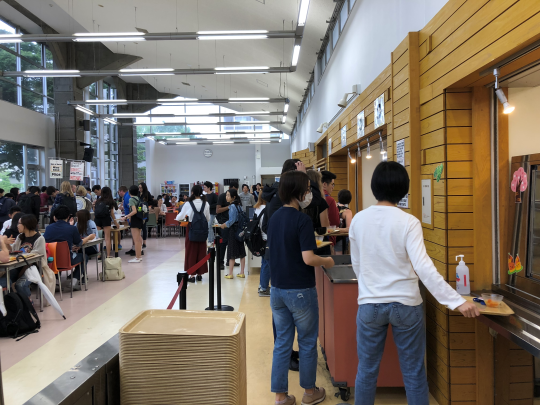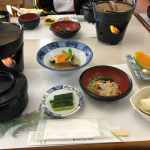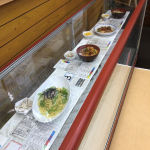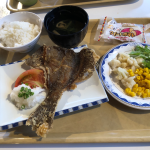
This summer, I decided to take a break from my biochemistry and biophysics major to study Japanese at Akita International University. The 11-person language class is a big change of pace from my 150-450 student science classes, but it has been really nice. Usually I have 3-4 hours of classes and culture workshops a day and the weekend to do homework and explore beautiful Tohoku area. The campus is small and really beautiful. It is surrounded by trees and contains multiple interesting buildings, many of which are interconnected by hallways because of the intense snow this area receives in the winter. This school is much smaller than Oregon State University. With a student population of less than 1000 students, there is only one dormitory and two areas of student apartments. Almost all students live on campus because the university is surrounded by forests and rice fields (this makes my Oregonian heart very happy). There is only one cafeteria on campus with two places to get food, which is fantastically different than what I got used to in my year at OSU. I’m allergic to wheat, which is quite prevalent in Japanese cooking due to soy sauce containing wheat. This poses quite a problem for me. Luckily, everything is labeled with allergens and the school prepares special food for those with more challenging allergies and food restrictions.
classes and culture workshops a day and the weekend to do homework and explore beautiful Tohoku area. The campus is small and really beautiful. It is surrounded by trees and contains multiple interesting buildings, many of which are interconnected by hallways because of the intense snow this area receives in the winter. This school is much smaller than Oregon State University. With a student population of less than 1000 students, there is only one dormitory and two areas of student apartments. Almost all students live on campus because the university is surrounded by forests and rice fields (this makes my Oregonian heart very happy). There is only one cafeteria on campus with two places to get food, which is fantastically different than what I got used to in my year at OSU. I’m allergic to wheat, which is quite prevalent in Japanese cooking due to soy sauce containing wheat. This poses quite a problem for me. Luckily, everything is labeled with allergens and the school prepares special food for those with more challenging allergies and food restrictions.
 At the beginning of the program you sit down with a cook and one of the program organizers and they fill out a card for you that lists all the things you can’t eat. You keep this card with your meal plan card and hand it to the lunch ladies and they will bring you food that you are able to eat. For the first week, I would hand my card to the ladies, they would look at it, then bring food for me. After about a week, some of the ladies started to recognize me so all I would have to do is make eye contact and exchange a smile of recognition. One of my friends also had to wait for special food and one day he mentioned that the lunch ladies had started calling him halal-san (Mr. Halal). Next time I went to get food, I listened and sure enough I heard the lunch ladies calling me komugi-san (Miss flour/wheat). It sounds very strange but it’s actually a good system. Almost all the lunch ladies recognize me now and instead of having to hand them my card I am greeted with a smile and “ah! Komugi-san!”. Even some of my friends have started calling me komugi-san.
At the beginning of the program you sit down with a cook and one of the program organizers and they fill out a card for you that lists all the things you can’t eat. You keep this card with your meal plan card and hand it to the lunch ladies and they will bring you food that you are able to eat. For the first week, I would hand my card to the ladies, they would look at it, then bring food for me. After about a week, some of the ladies started to recognize me so all I would have to do is make eye contact and exchange a smile of recognition. One of my friends also had to wait for special food and one day he mentioned that the lunch ladies had started calling him halal-san (Mr. Halal). Next time I went to get food, I listened and sure enough I heard the lunch ladies calling me komugi-san (Miss flour/wheat). It sounds very strange but it’s actually a good system. Almost all the lunch ladies recognize me now and instead of having to hand them my card I am greeted with a smile and “ah! Komugi-san!”. Even some of my friends have started calling me komugi-san.
Because of my allergies, I don’t really get a choice in what I eat. I never know what I am going to get. I wouldn’t say I’m a picky eater, but I’m not the most adventurous either. Every meal here is a surprise. Many of the foods I am given I have never eaten before and some I still don’t entirely know what they are. One of the most interesting things I was given was a piece of fried flounder, which still had scales, skin, a couple bones, and fins. My American palate was not used to eating something that still looked like its live version and I honestly wasn’t sure how to tackle the hard-outer skin and fins. I tried with a fork and knife at first but after one of my Thai friends laughed at me for trying to eat it like I steak I admitted I had no idea how to go about eating this. Thankfully, one of my Japanese friends showed me the technique of getting pieces of the meat using chopsticks. Eventually I figured out how to get meat from this piece of fish using chopsticks, though a bit inefficiently. Definitely gave my friends a good laugh. About a week later I was given the same dish but managed to eat it without much trouble. Ate the fins too. They are quite crunchy and tasty, by the way.
and some I still don’t entirely know what they are. One of the most interesting things I was given was a piece of fried flounder, which still had scales, skin, a couple bones, and fins. My American palate was not used to eating something that still looked like its live version and I honestly wasn’t sure how to tackle the hard-outer skin and fins. I tried with a fork and knife at first but after one of my Thai friends laughed at me for trying to eat it like I steak I admitted I had no idea how to go about eating this. Thankfully, one of my Japanese friends showed me the technique of getting pieces of the meat using chopsticks. Eventually I figured out how to get meat from this piece of fish using chopsticks, though a bit inefficiently. Definitely gave my friends a good laugh. About a week later I was given the same dish but managed to eat it without much trouble. Ate the fins too. They are quite crunchy and tasty, by the way.
I cannot praise the food staff at this university enough. They make me delicious Japanese food I would never be able to eat otherwise and gave me foods I have never tried before. I have some new favorites from the meals here. The staff even give me gluten free baked goods sometimes, which is not something I thought even existed in Japan. We don’t speak much of each other’s languages, but we still have daily interactions of greeting and thanks. Every trip to the cafeteria is an adventure, from the smile of recognition to responding to my new nickname to trying whatever delicious food has been prepared for me that day. Relationships like this are what motivate me to learn other languages. It doesn’t take much language for these sorts of simple yet meaningful interactions, so I encourage you to also go out and seek these interactions as well. Maybe you will even get a cool nickname.